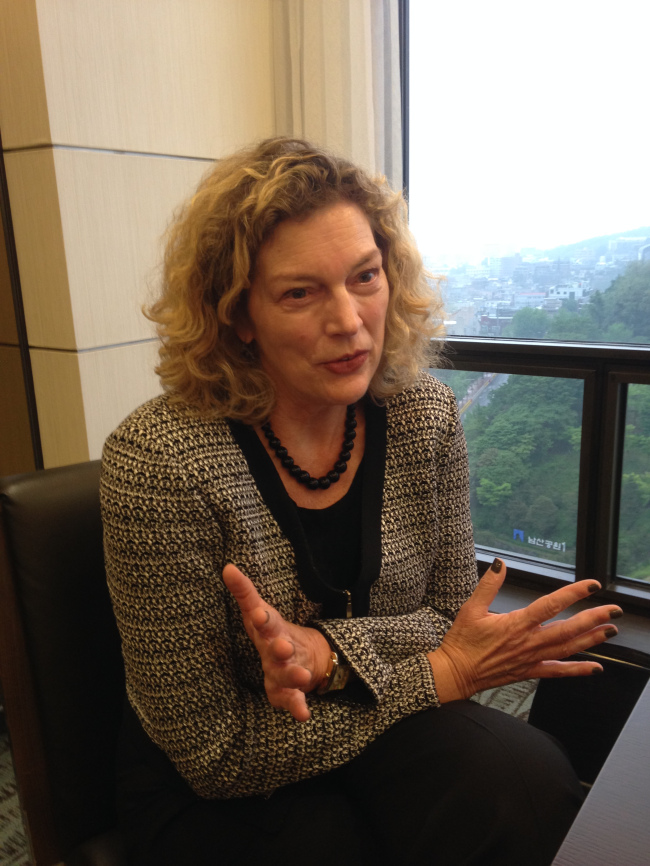Despite the strained ties between Seoul and Tokyo and other challenges, the South Korea-U.S. alliance is “more resilient, deeper and broader than ever,” former U.S. ambassador to Korea Kathleen Stephens said.
Concerns persist over Japanese Prime Minister Shinzo Abe’s drive for a “normal state” and ongoing attempts to undercut the country’s imperial past and previous apologies for wartime atrocities such as its sexual enslavement of Korean women on frontline brothels.
This has created tension as South Korea has singled out Tokyo’s atonement for the sex slavery as the prerequisite for reconciliation while the U.S. welcomes Japan’s greater military role in the face of economic woes and budget constraints and calls for greater trilateral security cooperation to better counter North Korean threats.
Given many factors having shaped the Korea-Japan relationship, outsiders inevitably have a “limited role” to play in helping to tackle bilateral flashpoints, the retired envoy said, stressing that such complicated issues as history should be handled with “great care.”
 |
| Former U.S. Ambassador to Korea Kathleen Stephens. (Shin Hyon-hee/The Korea Herald) |
“I don’t think that this is a zero-sum game. It seemed to me that the U.S. being strongly engaged and the good communication between the leaders of Japan and the U.S. is a good thing for Korea,” Stephens said in an interview with The Korea Herald on Tuesday in Seoul.
“If I were a Korean, I would approach the issue with confidence. If I may, it’s kind of an old thing to say, ‘Wow, the U.S. and Japan are closer, and maybe that means there is going to be some cost somehow to the Korea-U.S. relationship.’ I don’t think it’s ever been true.”
During her ambassadorial stint here from 2008 to 11, Stephens turned into an icon of public diplomacy. She blogged about the host country in Korean language, dipped into traditional food and biked all over the lower part of the peninsula. In one summer, she even flew to Jejudo Island to pick abalones and octopuses alongside female divers there.
Her affability, professionalism and command of the local language made many Koreans feel more comfortable with her superpower homeland.
The knife attack on the incumbent Mark Lippert in March, which she heard about on the radio back in the U.S., came as a shock to her. Yet she soon became “impressed” by his poised management of the incident and swift comeback to the public, as well as the outpouring of support from Koreans, she said.
“If you are in diplomacy, if you are in public life of any kind, wherever you are, there are always certain risks involved. … And you try to understand those risks and to mitigate but you can never prevent them entirely,” Stephens said.
“I don’t think he’s been dissuaded or discouraged in his commitment and enthusiasm.”
Listening to questions with curiosity and care, Stephens appeared fresh and full of vigor. As it was her first trip here in 18 months, she said she was viewing the country with “new eyes” and was excited to go biking again in the countryside, have her favorite food and reunite with Koreans and her two dogs left here, named Yeoyoo (composure) and Mooshim (detachment).
To her, public diplomacy is just “one additive” to diplomacy.
“From my first diplomatic assignment in 1978, I always felt that to be an effective diplomat, by that I define as someone who is able to perceive and understand to some extent views of the host country and communicate the views of your own country and build, not always agreement, but some kind of deeper appreciation and understanding of each other’s concerns and positions,” Stephens said.
“To do that, you couldn’t always talk to the people in the government, and you couldn’t only talk to the people who agree with you. You always have to widen the circle.”
The former envoy was visiting Korea to take part in a forum on Jejudo Island and give a lecture at a university in Seoul. After 35 years of diplomatic service, she retired following a brief term as interim ambassador to India concluding last December. She plans to study Asia more as a fellow at Stanford University’s Asia-Pacific Research Center soon.
“It’s very clear that how Asia relates within itself and to the outside world is really going to shape the century, whether on a political level or in terms of the regional, trade and security architecture,” Stephens added.
“It’s still a new story and developing thing. It’s very interesting.”
By Shin Hyon-hee (heeshin@heraldcorp.com)



